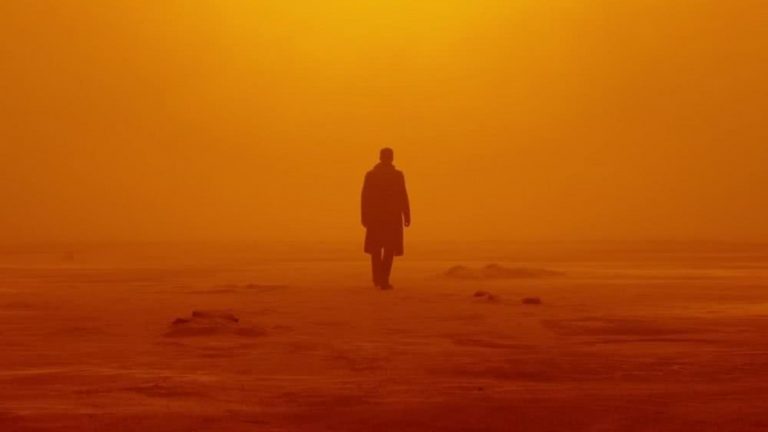It’s easy to forget, now that it’s the film that launched a thousand thinkpieces, how difficult Blade Runner once was. Alternating between icy cruelty and oversaturated ’80s sentiment, Ridley Scott’s glistening hunk of neon used the film noir genre against itself, undermining the robotic intensity of its heroes, and muddying some already troubled ethical waters. Using Philip K. Dick’s Do Androids Dream Of Electric Sheep? as little more than a springboard, it touched on everything from police brutality, to the mistreatment of “non-human entities”, to the things we’re really referring to when we talk about the soul.
Little wonder then that it tanked upon first release, both critically and commercially. It was too challenging; too quick to mix spectacle with the intellectual, and to challenge the status quo of both action movies and the everyday forces of authoritarianism we have largely and collectively chosen to accept.
Make no mistake: Blade Runner 2049, director Denis Villeneuve’s continuation of replicant hunter Rick Deckard’s story (sort of), is just as difficult. It might have already received a rapturous critical reception, and all signs are pointing to it at least recouping its budget – a win in a year where a number of once safe Hollywood bets have crashed and burned. But that doesn’t make it anything less of a problematic proposition than its precursor.
It’s best knowing as little as possible about the film as going in, so here are the very bare bones: following an unspecified yet devastating widespread environmental collapse, and a brief prohibition on the manufacturing of replicants, businessman Niander Wallace (a scenery-chewing and thankfully rarely seen Jared Leto) has bought out the Tyrell corporation from the first film and is using it to pump out thousands of “bioengineered humans” to exploit as slave labour. Meanwhile, detective K (Ryan Gosling), a kind of nouveau-Deckard, stumbles across a long buried secret while “retiring” the bulky, sad-eyed Sapper Morton (Dave Bautista), putting himself and the now reclusive Deckard in danger.
Which, sure, doesn’t exactly sound challenging – but neither did the plot of the first film, a deceptively simple story that eschewed the twistiness of genre heroes like Dashiell Hammett or Raymond Chandler in favour of a gradually enveloping trip down the ethical rabbit hole. Similarly, although defined by a number of surgically precise plot twists, Blade Runner 2049 is more interested in character notes than sprawling conspiracies, and its best moments are quiet, distinctly human setpieces: a gorgeous, intimate moment of holographic romance; a replicant shedding a single tear as she dispatches an enemy; a dog, licking whiskey up off the floor.
2049 is a film about the panic that washes over you when you discover that actually, all things considered, you are not particularly special.
It is, in that way, a film ready to make the spiritual and the sentimental visible. Just as Scott’s original allowed flashes of authenticity and warmth to come slicing through the layers of irony, and smoke-fogged, gaudy archness, so too does Villeneuve prove unafraid to really, deeply care, both about his characters, and his audience. 2049’s stakes are high because its hero, at first the picture of icy resolve, mutates into something else entirely, and even its standout antagonist, the pony-tailed and psychopathic Luv (Sylvia Hoeks) is granted moments of genuine pathos.
This, indeed, is the source of the film’s difficulty: at times it flirts so aggressively with schmaltz that the first response of the stony-hearted might be to sniff. 2049’s final, devastating shot will either work for you or it won’t, and its distinctly unconventional tragic central romance prompted the occasional loud snigger from the screening that this critic attended.
But, as with the first film, the source of 2049’s difficulty is also the source of its genius. Villeneuve’s guarded optimism – the distinct characteristic of every film he has made so far, from Arrival to Maelstrom – feels so conflicted, and cathartic, and genuinely beautiful when mixed into the brutal world of Blade Runner as to become genuinely radical. I’m not going to tell you that 2049 is the film that the world needs right now – that cliché is already growing tired – but I am going to say that it is refreshing to see a filmmaker use a big budget Hollywood vehicle to exhibit nothing less than radical kindness; to stake everything, absolutely everything, on sentiment.
Not, mind you that 2049 is some kind of prosaic serve of prettiness, or that its lacking in the sound and fury that has been Villeneuve’s other defining characteristic for years now – 2049 has all the nerve-shredding, gently hysterical horror of Sicario, or the underrated Enemy. Its climactic third act fight is genuinely disturbing, and a sudden moment of realisation for K is filmed with all the unflinching clarity you’d more commonly find in a horror movie.
Appropriately then, 2049 is, at its heart, a film about the panic that washes over you when you discover that actually, all things considered, you are not particularly special; that for humans just as for replicants, all the boxes have already been ticked before one has even been born.
But rather than despairing over our collective mundanity, and the things that make us the same, 2049 fervently embraces them. None of us might have the power to change the world, or even, when it matters, to properly change ourselves, but 2049 reserves all judgements. It is a film of considerable grace; a film unashamed to show off the bloodied contours of its heart. It also so happens to be a masterpiece.
Blade Runner 2049 is in cinemas now.


































